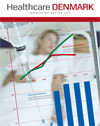 Healthcare DENMARK is a public-private partnership with a national, political mandate to promote Danish healthcare solutions and competencies abroad. The partnership is a framework for linking international partners with efficient Danish solutions and does not represent any individual company or product. Healthcare DENMARK is funded by the following public and private partners: the Ministry of Business and Growth, the Ministry of Health, the Ministry of Foreign Affairs, Danish Regions, Region of Southern Denmark, the Confederation of Danish Industry, the Danish Chamber of Commerce, COWI, Falck, KMD and Systematic.
Healthcare DENMARK is a public-private partnership with a national, political mandate to promote Danish healthcare solutions and competencies abroad. The partnership is a framework for linking international partners with efficient Danish solutions and does not represent any individual company or product. Healthcare DENMARK is funded by the following public and private partners: the Ministry of Business and Growth, the Ministry of Health, the Ministry of Foreign Affairs, Danish Regions, Region of Southern Denmark, the Confederation of Danish Industry, the Danish Chamber of Commerce, COWI, Falck, KMD and Systematic.
The Danish healthcare system is primarily publicly funded and based on free and equal access to healthcare for all citizens. It is a key priority that patients experience a coherent patient pathway, and to ensure close and efficient collaboration across the health sector.
The National level is where health policy takes its form. The Ministry of Health draws up guidelines for general planning and operation of healthcare services.
The Regional level consists of the five Danish regions, which are the main service providers in the healthcare system. Their healthcare responsibilities include hospital and psychiatric treatment, and parts of the primary healthcare system such as general practitioners and specialist doctors.
The municipal level provides rehabilitation and general disease prevention as well as home nursing and homes for elderly citizens with care facilities and associated care staff.
Download: Healthcare DENMARK: Innovating Better Life (.pdf, 2.305 KB).
Download from eHealthNews.eu Portal's mirror: Healthcare DENMARK: Innovating Better Life (.pdf, 2.305 KB).